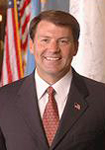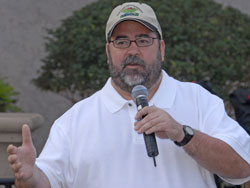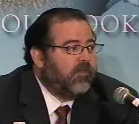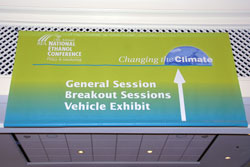Canadians seem to be willing to use ethanol and biodiesel… if they can get the green fuels.
This story in the Vancouver Sun says there are only TWO E85 ethanol pumps in the country, and biodiesel seems to be available mostly just for farmers and large fleets. But some groups are trying to change that:
 The Canadian Vehicle Manufacturers Association and the Canadian Renewable Fuels Association have lobbied government for programs and tax incentives not only to increase production of biofuels, but also to get them to customers.
The Canadian Vehicle Manufacturers Association and the Canadian Renewable Fuels Association have lobbied government for programs and tax incentives not only to increase production of biofuels, but also to get them to customers.
“You’ve got to be able to allow them to source the fuel,” said Gordon Quaiattini, president of the renewable fuels group.
Robert Sicard, president of UPI Energy which opened the first E85 pump in Guelph, Ont., last January, said it costs $30,000 to convert a gas pump to handle E85 and a government incentive program would help spread them across Canada much faster, as it has done in the U.S.
There are some 600,000 flex-fuel vehicles on Canada’s roads.
Any vehicle can take up to E10 without any engine modifications. Higher ethanol blends require a flex-fuel vehicle and there are 28 models available in Canada today, most from Daimler Chrysler, Ford and GM.
Many Canadians don’t even know they own a flex-fuel vehicle (the gas cap will be yellow), which isn’t surprising because many car salespeople don’t know what they are either, said Sicard.
“They didn’t know they had flex-fuel vehicles on the floor,” said Sicard, who supplied Guelph and Chatham car dealerships with yellow tags to hang on the rear-view mirrors saying “You are sitting in a flex-fuel vehicle” with a map on the reverse to the fuel station. Sales have picked up. Who doesn’t like this stuff? Who can find fault with environmentally friendlier products?”
In addition, the Canadian Renewable Fuels Association has stepped up its efforts to refute what it considers the false claims that biofuels add to world hunger. So, they’re trying to educate on two fronts: the government into providing the incentives to help make biofuels available… and the public so they can be assured they’re getting an environmentally-friendly fuel.
 Biofuels will be in the spotlight throughout the conference and the yet-to-be-completed Farm Bill will likely be a major topic of conversation as new agriculture secretary Ed Schafer will address the crowd on Friday during the general session.
Biofuels will be in the spotlight throughout the conference and the yet-to-be-completed Farm Bill will likely be a major topic of conversation as new agriculture secretary Ed Schafer will address the crowd on Friday during the general session. 


 The City of New Orleans will be running the buses that replace the losses from Hurricane Katrina on biodiesel.
The City of New Orleans will be running the buses that replace the losses from Hurricane Katrina on biodiesel. Gadsden, Alabama is getting into the swing of biodiesel… and it’s depending on the community to help fuel the green move.
Gadsden, Alabama is getting into the swing of biodiesel… and it’s depending on the community to help fuel the green move. It has been a great first day here at the National Ethanol Conference.
It has been a great first day here at the National Ethanol Conference.  The new leaders of the Midwest Governors Association (MGA) are committing their group to the advancement of the biofuels they see as the future for their region.
The new leaders of the Midwest Governors Association (MGA) are committing their group to the advancement of the biofuels they see as the future for their region. “I am honored to lead the Midwestern Governors Association over the next year,” said Rounds. “Our region has been blessed with many resources that we can use to address the challenges facing our states. Specifically, I am eager to work with my fellow governors to make sure the Midwest’s transportation infrastructure is maintained in the new federal Transportation Bill.”
“I am honored to lead the Midwestern Governors Association over the next year,” said Rounds. “Our region has been blessed with many resources that we can use to address the challenges facing our states. Specifically, I am eager to work with my fellow governors to make sure the Midwest’s transportation infrastructure is maintained in the new federal Transportation Bill.”  “As governors of our respective Midwestern states, we are committed to building a stronger alternative-energy economy that lessens our dependence on foreign oil and creates jobs in the process, said Granholm. By working with Gov. Rounds to improve our region’s transportation needs, we will make Midwestern states more competitive in this global economy.”
“As governors of our respective Midwestern states, we are committed to building a stronger alternative-energy economy that lessens our dependence on foreign oil and creates jobs in the process, said Granholm. By working with Gov. Rounds to improve our region’s transportation needs, we will make Midwestern states more competitive in this global economy.”  Here at the National Ethanol Conference golf is the first activity. RFA President Bob Dinneen got everyone started here this morning out at ChampionsGate golf course. Just before he gave everyone the send off I spoke to him about the Conference.
Here at the National Ethanol Conference golf is the first activity. RFA President Bob Dinneen got everyone started here this morning out at ChampionsGate golf course. Just before he gave everyone the send off I spoke to him about the Conference. NFL Hall of Famer Jack Youngblood is also on hand with us here today at the golf tournament. He welcomed everyone out at the start of the event.
NFL Hall of Famer Jack Youngblood is also on hand with us here today at the golf tournament. He welcomed everyone out at the start of the event.
 And he talked about cellulosic ethanol. “We recognize that in order to grow our industry we need to move beyond grain,” and Dinneen says it is already happening.
And he talked about cellulosic ethanol. “We recognize that in order to grow our industry we need to move beyond grain,” and Dinneen says it is already happening. It’s time for the National Ethanol Conference. I’ll be providing on the scene coverage once again this year and working closely with the Renewable Fuels Association again, including posting onto
It’s time for the National Ethanol Conference. I’ll be providing on the scene coverage once again this year and working closely with the Renewable Fuels Association again, including posting onto  The American Wind Energy Association, a Washington, D.C.-based trade group, estimates the industry employs about 20,000 people, not including those making turbines or other equipment.
The American Wind Energy Association, a Washington, D.C.-based trade group, estimates the industry employs about 20,000 people, not including those making turbines or other equipment. The Canadian Vehicle Manufacturers Association and the Canadian Renewable Fuels Association have lobbied government for programs and tax incentives not only to increase production of biofuels, but also to get them to customers.
The Canadian Vehicle Manufacturers Association and the Canadian Renewable Fuels Association have lobbied government for programs and tax incentives not only to increase production of biofuels, but also to get them to customers.